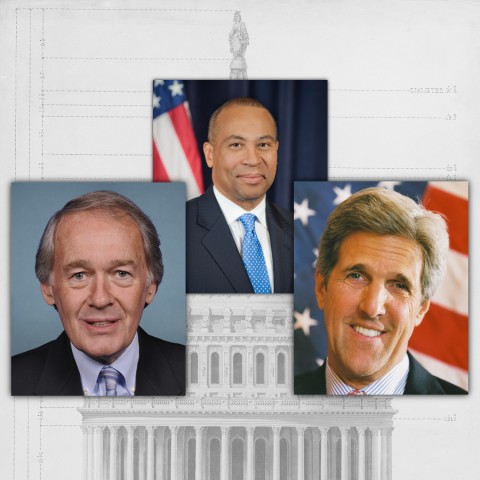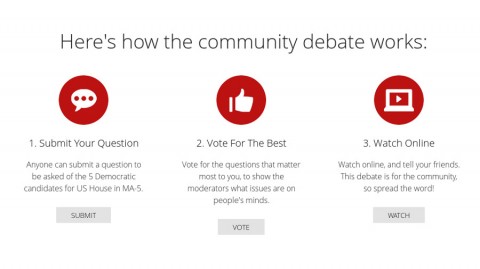So — Massachusetts’ fifth congressional district is throwing a special election.
This in itself isn’t news. Earlier this year, Ed Markey, who had long represented Eastern Massachusetts in the House of Representatives, was elected to the Senate to fill the seat that John Kerry vacated when he was appointed Secretary of State. By law, Governor Deval Patrick has one hundred sixty days to line up a replacement. And so, on December 10, folks in Middlesex, Suffolk, and Worcester Counties will come out, cast votes, and send someone new to the least popular institution in the United States.

What’s interesting about this election is not that it’s happening, but rather how the Democrats in MA-5 are going about choosing their candidate. Right now, there are five Democratic contestants in the race. Come October, there can be only one. So as part of the process of winnowing, Democrats are holding a first-of-its-kind, online, tech-savvy, freedom-centric, open-and-transparent event called an “open debate.”
This is exciting, folks. This hits all the right buttons.
The open debate system is a thing that was proposed during the 2008 presidential election cycle by a coalition of folks from across the American political spectrum, including Arianna Huffington and Markos Moulitsas on the Left, and Matt Stoller, David Kralik, and Mindy Finn on the Right. In an open letter to the Los Angeles Times, they — actually, probably celebrity lawyer and coalition-member Lawrence Lessig — articulated the main problem with political debates as they’ve been held since the Bush-Dukakis era: that there’s too much discretion in the hands of (media) gatekeepers; and that in the interest of the media maintaining good relationships with candidates, debate questions are largely gimmicky and not hard-hitting enough.
The solution that they propose is twofold. And it’s entirely simple. Debates, they write, are for the benefit of the public. Therefore, debates ought to be ‘owned’ by the public — their raw footage should be in the public domain. And therefore, debate questions ought to be chosen by the public — debate organizers ought to use online crowd-sourcing technology to allow people to propose questions for candidates, and then vote to determine which questions are most relevant.
This, as you probably recall, did not happen in the 2008 presidential elections. Nor did it happen in 2012. But what’s so interesting about the Democratic primary for this special election in this one district in Massachusetts is that a version of this proposal is happening right now.

I’d like to point you all to OpenDebateQuestions.com. The website, run by the Progressive Change Campaign Committee, is the venue at which the open debate experiment is taking place, beginning to end. Between now and the August 10 debate, whether you live in the district or not, you’re free to go online, propose questions for the candidates, and vote for which questions are in, and which are out.
According to the OpenDebateQuestions folks, the way that it works is that in exchange for your name, zip code, and email address (which is always kept private), you’re allowed to propose as many questions as you want, and you’re allowed to vote — once — for as many questions as seem appealing to you. The organizers will then compile two lists — one with questions and votes from around the country, and one that’s just from Massachusetts — and they’ll choose the actual questions for the debate from among the top fifty asked by folks within the state.*
The idea, according to OpenDebateQuestions, is that making the submission and voting process fully public and transparent ensures that the topics covered in election debates reflect the interests and priorities of the voters, rather than campaign operations and corporate media.

The problem with this particular open debate, of course, is that it’s just one side doing it. While the 2008 proposal came from a bipartisan group of journalists, activists, and political operatives, the Progressive Change Campaign Committee is just what it claims to be, and no more. It was founded in 2009 by Adam Green, former MoveOn bigwig, and Stephanie Taylor, labor organizer. And as its website URL (boldprogressives.org) suggests, it explicitly promotes bold progressive candidates.
On the other hand, if you look at MA-5, the Democratic primary is the real election in that district anyway. It has gone Democrat in every congressional election since 1973, and in the last round — in 2012 — Ed Markey beat sacrificial Republican Tom Tierney 75.5% to 24.5%. That’s a pretty big margin.
And besides, it’s a whole lot more encouraging than Republican debate reform. RNC chair Reince Priebus has been on television, this week, threatening to ban CNN and NBC from GOP’s 2016 primary debates, nominally over concerns that those networks are running Hillary-sympathetic programming, but actually because, as Priebus says, moderators from those stations are not serving the best interests of the candidate and the party — they are too interested in the needs of the public, and inadequately interested in making the candidates look good.
None of this is to excuse the fact that this whiz-bang, increase-the-democracy-of-democratic-elections, real-and-genuine positive innovation is only being implemented on one side, or that it’s being implemented by an explicitly partisan organization. Clearly, whatever the RNC’s position on the 2016 presidential primary debates, MA-5 would be a better laboratory for open debates if everybody got to take part.
But even as it is, it’s a step in the right direction in terms of breaking the hold of big money and big media on our increasingly broken elections system. And I, for one, will be watching carefully to see how this turns out.
* I imagine that OpenDebateQuestions allows voting from more than just Massachusetts in order to build momentum for implementing this system elsewhere around the country. But I don’t know for sure.